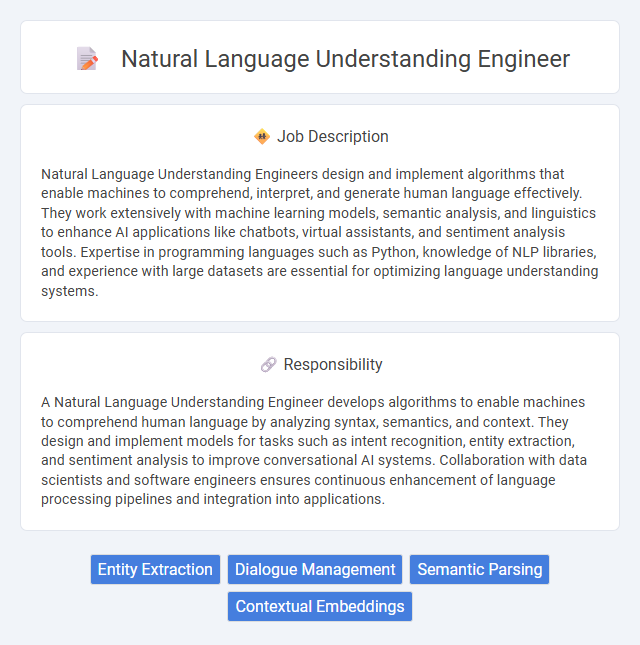
Natural Language Understanding Engineers design and implement algorithms that enable machines to comprehend, interpret, and generate human language effectively. They work extensively with machine learning models, semantic analysis, and linguistics to enhance AI applications like chatbots, virtual assistants, and sentiment analysis tools. Expertise in programming languages such as Python, knowledge of NLP libraries, and experience with large datasets are essential for optimizing language understanding systems.
Individuals with strong analytical skills and a deep interest in linguistics or computer science are likely to be suitable for a Natural Language Understanding Engineer role. Candidates who enjoy problem-solving, have experience with machine learning models, and possess a solid understanding of semantic analysis might thrive in this position. Those who prefer repetitive tasks without much variation or lack interest in language technology may find the role less fitting for their strengths and preferences.
Qualification
A Natural Language Understanding Engineer requires strong expertise in linguistics, machine learning, and AI frameworks such as TensorFlow or PyTorch. Proficiency in programming languages like Python and experience with NLP libraries including spaCy, NLTK, and Hugging Face Transformers are essential. Advanced qualifications often include a degree in computer science, computational linguistics, or related fields, with a focus on semantic analysis, syntax parsing, and language modeling techniques.
Responsibility
A Natural Language Understanding Engineer develops algorithms to enable machines to comprehend human language by analyzing syntax, semantics, and context. They design and implement models for tasks such as intent recognition, entity extraction, and sentiment analysis to improve conversational AI systems. Collaboration with data scientists and software engineers ensures continuous enhancement of language processing pipelines and integration into applications.
Benefit
Natural Language Understanding Engineers likely gain opportunities to work with cutting-edge AI technologies, enhancing their technical expertise and career growth. They probably benefit from involvement in diverse projects that improve machine comprehension, offering a dynamic and intellectually stimulating work environment. Their role may also result in high demand for their specialized skills, leading to competitive salaries and job security.
Challenge
Challenges in a Natural Language Understanding Engineer role likely revolve around interpreting ambiguous human language with precision, managing vast and diverse datasets, and constantly improving models to handle new linguistic patterns. Engineers probably face difficulties in disambiguating context, sarcasm, and idiomatic expressions within varied languages and domains. Maintaining model accuracy while scaling solutions for real-time applications appears to be an ongoing and complex challenge.
Career Advancement
A career as a Natural Language Understanding Engineer offers significant advancement opportunities through mastering machine learning algorithms, deep neural networks, and linguistic data processing. Progression often leads to roles such as Senior NLU Engineer, AI Research Scientist, or Technical Lead in AI development teams. Expertise in semantic analysis, intent recognition, and context modeling drives innovation in conversational AI, boosting career growth and industry demand.
Key Terms
Entity Extraction
Natural Language Understanding Engineers specializing in entity extraction develop algorithms and models that identify and classify key entities such as names, dates, locations, and organizations within unstructured text data. They utilize techniques including named entity recognition (NER), deep learning models like transformers, and sequence labeling to enhance machine comprehension and information retrieval accuracy. Expertise in programming languages like Python, frameworks such as spaCy or Hugging Face, and understanding of linguistic patterns are critical for optimizing entity extraction workflows in various AI applications.
Dialogue Management
Natural Language Understanding Engineers specializing in Dialogue Management design and implement systems that interpret user intents and manage conversational flow in real-time applications. They utilize machine learning models, semantic parsing, and context tracking techniques to ensure accurate response generation and natural interaction in chatbots and virtual assistants. Expertise in state tracking, dialogue policies, and reinforcement learning algorithms is essential for optimizing user engagement and system performance.
Semantic Parsing
Natural Language Understanding Engineers specializing in semantic parsing design algorithms that convert natural language into machine-readable representations, facilitating accurate intent recognition and context extraction. Expertise in deep learning models such as transformer architectures and semantic role labeling is essential to enhance parsing precision in complex language scenarios. Proficiency in programming languages like Python, alongside tools such as TensorFlow or PyTorch, supports the development and deployment of scalable semantic parsing systems within conversational AI applications.
Contextual Embeddings
Natural Language Understanding Engineers specialize in developing models that leverage contextual embeddings to capture the meaning of words within varying contexts, enhancing semantic accuracy in tasks like sentiment analysis and machine translation. They implement architectures such as BERT, ELMo, and GPT, which dynamically generate word representations based on surrounding text, improving the understanding of polysemous words and complex sentence structures. Mastery of deep learning frameworks and expertise in tokenization, attention mechanisms, and fine-tuning pre-trained language models are essential for optimizing contextual embeddings in real-world NLP applications.
 kuljobs.com
kuljobs.com